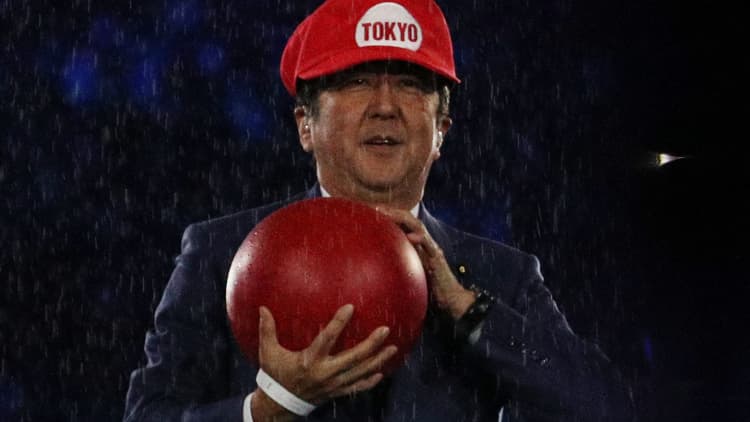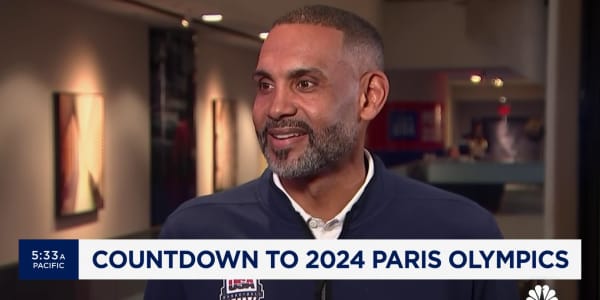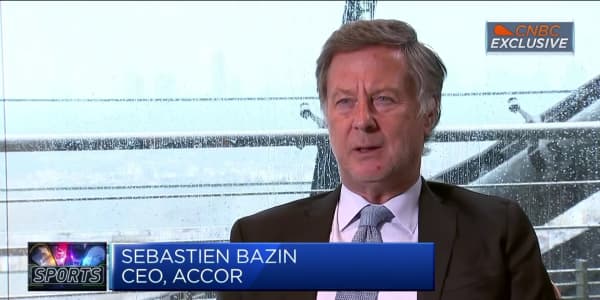Tokyo stole the show at the Olympic closing ceremony in Rio de Janeiro this week as the event's next host city prepares for a cultural charm offensive ahead of the 2020 Games.
In a surprise move, Japanese Prime Minister Shinzo Abe dressed up as Super Mario at the ceremony, emerging from the iconic green warp pipe that fans of the video game are so familiar with, earning the 61-year old the nickname of 'Super Abe.' Social media went abuzz following the stunt, which was to commemorate the official Olympic handover to Tokyo.
Created by Japanese electronics firm Nintendo in the 1990s, the Mario games are perhaps Japan's best-known cultural export. Hello Kitty, manga cartoons Capitan Tsubasa and Doraemon as well as video game Pac Man—highly popular Japanese products—also made appearances at the closing ceremony.
"I think there's no question that the Abe-as-Mario stunt was designed to leverage 'Cool Japan' ahead of 2020. Undoubtedly, we'll see a lot more of that over the next four years," said Tobias Harris, vice president of political analysis firm Teneo Intelligence.
As the Abe administration tries to inject new life into an economy weighed down by two decades of deflation, it's also eager to build Japan's cultural brand overseas in a nod to the years when Nintendo, Sony, and Panasonic were cutting-edge brands in consumer electronics.
Under the Abenomics umbrella, the government created a public-private platform to propel Japanese culture abroad dubbed 'Cool Japan.' The campaign is centered on the tenets of political scientist Joseph Nye's 'soft power' ideology: using a country's cultural appeal instead of economic or military might to increase global influence.
When Tokyo won the bid to host the 2020 Games, it was deemed the best opportunity to leverage 'Cool Japan.'
"Abe's appearance in Rio shows that Japan does have cultural capital it can leverage at strategic moments to boost its image," added Harris.
While 'Cool Japan' isn't deemed essential to Abenomics' goals of raising productivity and boosting the workforce, it's hoped to boost entrepreneurship and usher in a wave of innovation to transform the country's creative industries into a new source of growth.

The Mario stunt was just a preview of Tokyo's Olympic fever, suggested Benjamin Boas, a tourism ambassador for Tokyo's Nakano Ward and a government-designated "Cool Japan" ambassador.
"In the past, the government has struggled to communicate effectively with overseas audiences but in this instance, the choices of content and characters were both appropriate and effective for reaching out to non-Japanese supporters. It may be the first video produced by the Japanese government with real potential to go viral worldwide."
That could be critical for tourism figures in the lead up to the 2020 Games. Increased consumer spending is a key pillar of Abenomics but while that's still struggling to gain traction domestically, foreign tourists are helping.
Japan has experienced record spikes in incoming arrivals. For the first six months of the year, the number of foreign tourists reached 11.7 million, exceeding 10 million for the first time in history, according to government statistics.
Some analysts believe 'Cool Japan' is the key trigger.
"The reason why tourism growth has taken off is because of the younger generation, who's interested in Cool Japan. For example, it's impossible to get a ticket to visit the anime museum because demand is so strong, compared to an exhibition on zen scrolls," said Jesper Koll, CEO of investment firm WisdomTree Japan, alluding to the various museums around Tokyo focused on manga and anime characters.
"I expect promotion of 'Cool Japan' to grow exponentially over the next four years," he added.




